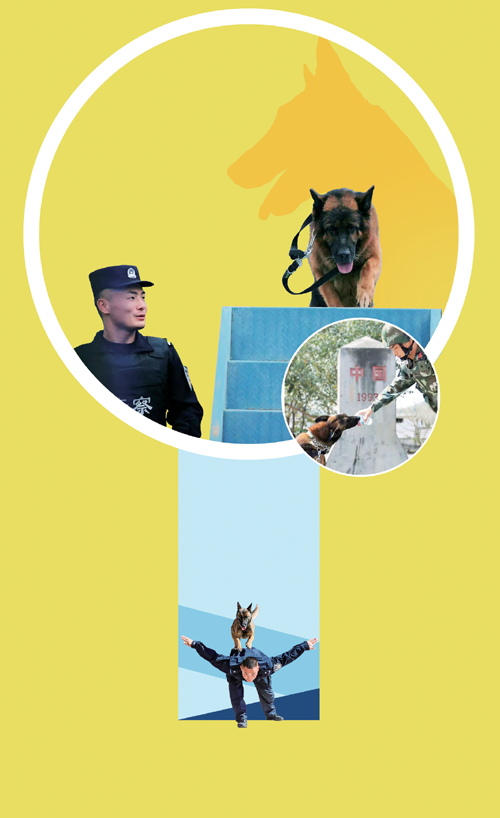More than a partner


Inside the life of a police dog trainer and the making of one of China's "Meritorious Dogs", Guo Jiatong reports.
Zhou Zhou has always had a soft spot for dogs. When he was 9, he adopted two stray puppies because he was worried they wouldn't survive the winter on their own. Watching the TV series Super Partner (2014), which portrayed the deep bond between police dogs and their handlers, further cemented his childhood dream — to work with dogs in law enforcement.
That dream came true in 2011 when Zhou joined the Jiangqiao police dog training base in Dehong, Yunnan province. Among the three dogs he worked with over the years, he takes immense pride in Jijunxing, a Belgian Malinois.
"Jijunxing is a female dog, smaller than the two male dogs I had before," Zhou explained. "But her smaller build makes her more agile and sleek. She's exceptionally meticulous in her work — not the fastest, but very precise."
Over her eight-year career, Jijunxing assisted in solving 137 cases, helped apprehend 66 criminal suspects, and seized more than 80 kilograms of illegal drugs. She and Zhou also won multiple national awards, and in 2023, she was named one of the inaugural "Meritorious Dogs" by the National Immigration Administration.
"Through dedicated daily training and continuous enhancement, these canine companions become crucial to real-world operations, saving time and effort for law enforcement," Zhou said.
According to him, about 70 percent of police dogs in Dehong specialize in drug detection, like Jijunxing.
Training starts when they're still young. In addition to basic commands like "sit" and "lie down", police dogs must learn to swim, crawl, and resist food temptations. Their physical training includes obstacle courses, sprints, and long-distance runs.
Drug detection dogs receive more specialized training. For example, handlers hide drug-scented decoys in bags, vehicles, rooms, on people, and in wooded areas. The dogs must locate these scents accurately — a skill they develop through repetition and guidance.
But training isn't always smooth. "Every time I take the dog out, if the session doesn't go well — if there are lots of mistakes — I feel frustrated the rest of the day," Zhou admitted. "I keep wondering: Why did she make a mistake today that she didn't make yesterday? Was it my handling? Did I give the command too late? Was the reward not motivating enough?"
Because dogs can't talk, handlers must rely on observation and intuition. This, Zhou said, is where patience becomes crucial.
He noted that people often underestimate the dedication and skill required for the job. "They think it's just playing with dogs. But without love, perseverance, patience, and care, you can't truly succeed."
After years of training together, Zhou and Jijunxing developed a deep mutual understanding. "When I want her to search in a certain direction, I just tilt my head and glance over — she picks it up instantly."
This bond is rooted in the dog's sensitivity. "A police dog senses everything — your tone, your emotions," Zhou said. "When I raise my voice or even just glare, she knows I'm unhappy."
That's why it's important not to train in a bad mood. "It's easy to lose patience and scold the dog, which damages trust," he said. "You must keep the training environment positive. Only then can trust grow — and trust is essential for working in high-pressure law enforcement situations."
Beyond duty
But their relationship wasn't just about work. "Jijunxing is like family to me," Zhou said. "I never refer to a police dog as 'it'. I say 'he' or 'she' because they're not just animals — they're full of emotion and spirit."
Contrary to the tough image many have of police dogs, Jijunxing had her tender moments. "Every time I sit down, she insists on climbing into my lap — never content to stay on the ground. Whether I'm on the lawn or a bench, she jumps up and settles in," Zhou recalled with a smile.
That bond made their farewell all the more painful. Last month, Jijunxing passed away, having fulfilled her mission of serving alongside Zhou and protecting the community from drugs.
To young people aspiring to become police dog trainers, Zhou offered this advice: "Don't choose this path just because you saw it on TV or think it looks fun. That kind of impulse won't last. You need long-term commitment."
He noted that while police dogs are considered part of the force's "equipment", they're fundamentally different from other tools — they're living beings with emotions. Firearms only require regular maintenance, but dogs go through birth, aging, illness, and death. They need care, attention, and companionship.
Zhou has been doing this for 14 years. "Not once have I thought of quitting. Once you choose this path, you must stick with it. Only with love and dedication can you become a competent trainer."





































